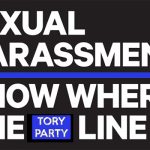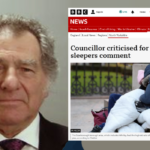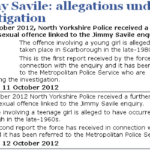Catastrophic Council Standards Blunder
- an “In My View” opinion piece by NIGEL WARD, commenting on stunning incompetence in the Legal & Democratic Services departments of Councils in our area.
~~~~~
Historically, the process under which the ethical conduct of elected members of local Councils was regulated by the Standards Board for England (SBE), established under the Local Government Act 2000 and sponsored by the DCLG.
The SBE was abolished on 1st April 2012 under the terms of the Localism Act 2011.
First and second tier Councils throughout the country were each required to implement (and publish) a new Councillors’ Code of Conduct under which ethical standards of elected members should thereafter be regulated. The duty of Councils to promote and maintain high ethical standards of conduct is set out in s.27 of the Localism Act 2011.
To aid Councils in formulating legally adequate terms for their Codes of Conduct, parliament published a Briefing Paper – what amounts to an instruction manual – an early paragraph of which states, inter alia:
“Each local authority must publish a code of conduct, and it must cover the registration of pecuniary interests, the role of an ‘independent person’ to investigate alleged breaches, and sanctions to be imposed on any councillors who breach the code.”
It is helpful to view these legal requirements (in law, the word ‘must’ means ‘MUST’ – not ‘may’, or ‘should’, or ‘if you feel like it’, or ‘Jim says it’ll be near enough’ – but ‘MUST’), in the form of a simple check-list:
Thus, each local authority MUST:
1) publish a Code of Conduct, which MUST cover:
[a] the registration of Councillors’ pecuniary interests (or DPIs – Disclosable Pecuniary Interest),
[b] the role of an ‘independent person’ to investigate alleged breaches of the Code by Councillors,
[c] a schedule (list) of possible sanctions (penalties) to be imposed on any Councillors who are found to have breached the Code.
To be absolutely clear, these conditions are not optional; they are mandatory. All of them. That is to say, without any one of them, no Councillors’ Code of Conduct complies with the law (being incomplete), and ALL outcomes under the new Standards regime (known as ‘Decision Notices’) are, therefore, null and void.
In a recent Court Hearing, it was ruled that:
“It was uncontroversial before me that, there being no common law right for an authority to impose sanctions that interfere with local democracy, upon the abolition of these sanctions and outside the categories I have described above, a councillor in England can no longer be disqualified or suspended, sanctions being limited to (for example) a formal finding that he has breached the code, formal censure, press or other appropriate publicity, and removal by the authority from executive and committee roles (and then subject to statutory and constitutional requirements).”
Again, a check-list is helpful:
“…sanctions being limited to (for example)”:
[1] a formal finding that (a Councillor) has breached the Code,
[2] formal censure,
[3] press or other appropriate publicity,
[4] removal by the authority from executive and committee roles.
It is the last passage in parentheses in this ruling that is critical in the present matter – “subject to statutory and constitutional requirements”.
In the present case, the KEY “statutory and constitutional requirement” (the KEY ‘MUST’) is that, in accordance with the Localism Act 2011, a schedule of possible sanctions MUST be published in the Code of Conduct – as I set out in the first part of this article:
1) publish a Code of Conduct, which MUST cover:
[c] a schedule (list) of possible sanctions (penalties) to be imposed on any Councillors who are found to have breached the Code.
Some authorities, for example Medway Council (as recently as September 2017), have reviewed their procedures and are now in full compliance with the law by including a schedule of possible sanctions within their published Codes of Conduct, thus:

Councils that have not published a schedule of possible sanctions within their respective Codes of Conduct cannot impose any sanctions whatsoever.
Examining the current Councillors’ Codes of Conduct at (follow the links):
North Yorkshire County Council,
East Riding of Yorkshire Council and
as displayed on their respective websites, I note that all three are defective in that not one of them complies with the requirement (the ‘MUST’ marked [c], above) to publish, within their respective Codes of Conduct, a schedule of possible sanctions available to be imposed upon Councillors who have been found to have breached the Code.
In short, it would appear that NYCC, ERYC and SBC are unable to impose sanctions, having each spent a considerable amount of public money administering scores of Formal Complaint investigations and hearings over the past FIVE YEARS, and publishing Decision Notices that are utterly ineffectual and entirely worthless.
There are 7 District/Borough Councils and 731 Town/Parish Councils in North Yorkshire. ERYC, being a unitary authority, has no District/Borugh Councils but nevertheless boasts 168 Town/Parish Councils. Given the proclivity of Monitoring Officers and Town/Parish Clerks to copy/paste from templates (rather than originate) their policy documents, I expect that the vast majority have used NALC, ERNLLICA or YLCA templates to prepare their Councillor’s’ Codes of Conduct.
The probability is that a very high percentage (perhaps all – or all but a handful) are unlawful – and have been so since 2012.
Councillors who have been censured unlawfully may have grounds for civil action in the courts. There can be little doubt that sanctions, especially when publicised in the press, amount to serious reputational damage. Where such damage has been inflicted as a direct result of the publication of sanctions against a Councillor under a Code of Conduct procedure without lawful basis, defamation may have taken place.
If this blunder has (as I suspect) been repeated throughout the country, I would imagine Councillors will be taking advice. A class action is conceivable. Councils can be relied upon to fight any claims to the bitter end, only to lose (as with the MARRIOTT constructive dismissal claim) at stupendous cost to the public purse, safe in the knowledge that it is the public who will pick up the tab.
But the real injustice is that Monitoring Officers (paid public servants) can evince such astonishing incompetence and yet continue to draw £75K – £150K per annum salaries (with commensurate pensions).
Readers will recall the widely publicised Standards Hearing against ERYC Councillor Dominic PEACOCK [Con.>Ind.] in which he was ‘required’ to apologise (for having Tweeted offensive remarks concerning murdered Labour MP Jo COX), which he refused to do, safe in the knowledge that the Standards Committee had no power over him – even though his breach of the Code of Conduct was exceptionally flagrant.
In two similar cases, Scarborough Borough Council Standards Committee deftly avoided attempting to impose sanctions on either Councillor Phil ‘Tweet Tweet” TRUMPER [Con.] over his offensive re-Tweets denigrating victims of the Grenfell Tower inferno, or Mayor of Whitby Councillor Noreen “Shove Your Camera Up Your Arse” WILSON [Lab.] regarding her disgraceful treatment of members of the public.
Where did it all go wrong?
At NYCC, the 2012 Standards arrangements were drafted by the then Head of Legal & Democratic Services and Monitoring Officer Carole DUNN, who left in the spring of 2014 and was replaced by Mr Barry KHAN who, probably unknowingly, inherited Ms DUNN’s mistake.
Unfortunately for Mathew BUCKLEY, Head of Legal & Democratic Services and Monitoring Officer at ERYC, who has been in his position for around a decade, there is no long-gone predecessor to whom the buck may be passed.
At SBC, a Report to Cabinet dated 25th January 2012, authored by the then SBC Head of Legal & Democratic Services and Monitoring Officer Ian ANDERSON, was cited in a further Report, signed off and presented to Cabinet on 22nd May 2012 by newly-appointed Head of Legal & Democratic Services and Monitoring Officer Mrs Lisa DIXON, who made the Recommendation (s.3) “to bring the Code of Conduct in line with legislative changes that have been introduced by the current government pursuant to the Localism Act”, setting out in great detail the necessary changes required under the Localism Act.
Alas for Lisa, there is no schedule of possible sanctions.
Whoops!
Nevertheless, Mrs DIXON assured the Cabinet:

Mrs DIXON was satisfied that there were no implications. Not much!
This begs the question: Is the SBC Monitoring Officer now aware (albeit, approaching six years belatedly) that the SBC Code of Conduct is fatally flawed?
It is interesting to note that the SBC Standards Committee met only once in 2017 (three other scheduled meetings having been cancelled).
Has the regulation of Councillors’ conduct all but evaporated at SBC?

Monitoring Officer Lisa DIXON (left) and Councillor John NOCK [Con.]
Interesting, too, is the fact that the SBC Portfolio Holder for Legal & Governance (which includes Standards) is none other than Councillor John NOCK [Con.], who himself escaped unscathed from a Standards Hearing pursuant to a Formal Complaint against him on the grounds that he had told members, face to face, in reference to predatory sex abusers Jimmy SAVILE and Peter JACONELLI, that:
“He [JACONELLI] was not a predatory paedophile. He was not like Jimmy Savile. He was only handing out money to poor kids for giving him a wank”.

The outcome? Guilty, as charged.
The sanctions? Councillor NOCK was referred to his own party – the Conservative Party – who promptly did nothing. Apparently, Councillor NOCK was secure in the knowledge that JACONELLI’s victims/survivors were strictly in the 11-14 age-range, which allegedly made him not a paedophile at all – rather, a mere “hebephile”. Quite unlike Jimmy SAVILE, whose victims/survivors included children under eleven, making him a full-blown paedophile. Thus, the most risible and tasteless piece of sophistry side-stepped the application of (anyway non-existent) sanctions. Could you make it up? And, to cap it all, Councillor NOCK was rewarded for his digraceful conduct with promotion to a place on the Cabinet.
On second thoughts, perhaps that was a sanction!
It may be coincidental that NYCC, ERYC and SBC are all Tory-dominated Councils. In each case, the Code of Conduct has been ratified by Full Council, where the Conservative vote is unassailable. A Code of Conduct drafted loosely permits a deal of latitude, and where there is latitude, influence may be brought to bear. Which leads me to the Standards Hearing against ERYC Leader Councillor Stephen PARNABY [Con.] last November, when it was admitted that “a series of complaints” were lodged, but only four of them investigated by ERYC solicitor Gemma PERCY.
Councillor PARNABY, in accordance with the recommendation of Monitoring Officer Mathew BUCKLEY, was duly (and unsurprisingly) exonerated. But what if the entire series of allegations had been diligently investigated, with the result that some (or all) of the Complaints against Councillor PARNABY were upheld? Under the present Code, Councillor PARNABY was at liberty to do exactly as Councillor PEACOCK [Con.] did – tell the Standards Committee – and Full Council – to “get stuffed”.
Again at East Riding of Yorkshire Council, where Councillor Andy STRANGEWAY [Ind.] has been challenging the absurdities of the Standards regime, it remains to be seen whether or not Full Council, when it next sits (next Wednesday January 10th 2018), will act ultra vires by ratifying sanctions which the Standards Sub-Committee had no lawful right to impose on Councillor STRANGEWAY (because they are not listed in the Code of Conduct, thereby rendering it invalid).
Any Code of Conduct that is incapable of handing down and enforcing meaningful sanctions to restrain the conduct of errant Councillors is not worth the pixels it is written in – it is an utterly futile waste of Officer and Councillor resources, and money. Our money. Standards Investigations and Hearings can easily cost between £10K-£25K or more each.
I have raised the matter of inadequacies of the current Standards regimes with all three Monitoring Officers (SBC, ERYC & NYCC) to no avail. I have even offered my assistance in re-drafting – neither accepted nor politely declined. Perhaps they prefer it how it is; malipulatable.
Skeptical readers who imagine that I am alone in my concerns over the present Standards arrangements are referred to former Lambeth Borough Council Officer Mark HYNES’ article “Tower Hamlets case highlights toothless standards regime” – I quote:
“Not only did the secretary of state seem unaware of the true implications of the toothless standards regime that we now have, but he is considering reducing further the statutory protection afforded to chief executives, finance directors and chief legal advisors.
Without such enhanced statutory employment protection, there is a likelihood that the only deterrent to members failing to comply with upholding proper standards in public life will be the ballot box.”
This is clearly not good enough. The ballot box presents no deterrent to Chief Execs, Finance Directors and Legal Director whose tenure is more or less cast-iron and who are virtually unaccountable to electors – or even to Councillors.
The plain truth is that, in the absence of any effective regulation of Councillors’ and/or Officers’ conduct, it is inevitable that domineering, self-serving and thoroughly disreputable individuals will continue to elbow their way into controlling positions within, or (in the case of Officers) in collusion with, the dominant political parties at local Councils.
Some observers have suggested that such is already the case.
Standards regimes? Fix ’em . . . or scrap ’em!



























Comments are closed.